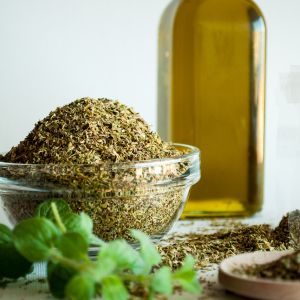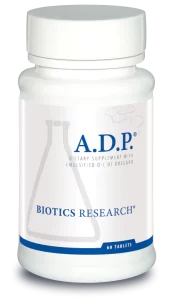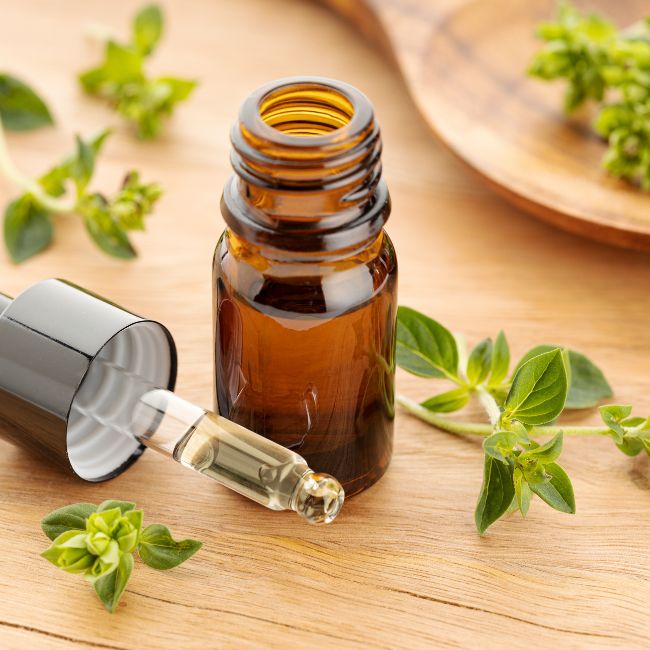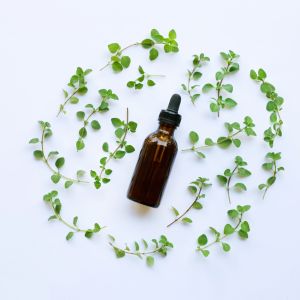The Basics
Organic oregano oil comes from the leaves and flowers of the oregano plant (Origanum vulgare). Phenolic compounds like carvacrol and thymol, primarily responsible for its therapeutic properties, enrich the oil. Additionally, it’s known for its impressive range of health benefits, primarily due to its potent antioxidants and anti-inflammatory properties. It offers various uses in treating and managing multiple health conditions. Let’s dive right in!
Therapeutic Properties of Oregano Oil
- Respiratory Conditions: Oregano oil helps alleviate symptoms of respiratory conditions like colds, coughs, sore throats, and bronchitis due to its expectorant properties.
- Digestive Problems: It aids in digestion and helps alleviate issues like bloating and indigestion. Its ability to balance gut bacteria also benefits overall digestive health. I use oregano oil frequently when treating patients with SIBO (small intestinal bacteria overgrowth).
- Skin Conditions: Applied topically (in a diluted form), organic oregano oil can treat skin conditions such as acne, dandruff, and other fungal or bacterial skin infections.
- Parasitic Infections: Oregano oil treats parasitic infections, although more research is needed. [2]
- Immune System Support: Its general antimicrobial properties support the immune system, potentially making the body more resistant to infections.
- Allergies: Some people use oregano oil to alleviate allergy symptoms, although scientific support for this use is limited.
- Diabetes prevention: Some studies suggest that oregano oil may have a role in regulating blood sugar levels. [3] Its components help improve insulin sensitivity, therefore aiding the body in maintaining proper blood sugar levels.
- Lower Cholesterol: Oregano oil might also benefit lipid levels, reducing bad cholesterol (LDL) levels and increasing good cholesterol (HDL). An improved lipid profile is associated with a lower risk of developing type 2 diabetes. [4]
The anti-properties
- Antibacterial: Organic oregano oil can be effective against certain strains of bacteria, making it a strong candidate for a natural antimicrobial. The substance cavacrol in oregano oil causes its antibacterial properties. [1]
- Antioxidant: It’s rich in antioxidants, cavacrol, and thymol, which help neutralize free radicals in the body. Furthermore, the antioxidants help prevent chronic diseases like heart disease and cancer.
- Anti-fungal: Its anti-fungal effects make it useful in managing fungal infections, such as athlete’s foot, yeast infections, and nail fungus.
- Anticancer Potential: Preliminary studies suggest that the compounds in oregano oil might have anticancer properties. However, more research is needed to understand its effects. Its superstar substance, cavacrol, is again responsible for this possible effect.
- Anti-inflammatory and Analgesic: Organic oregano oil is beneficial in reducing inflammation, and it relieves pain, which helps with conditions like arthritis and muscle or joint pain.
Usage, Dosage, and a Word of Caution
Oregano oil is potent and should be used with caution. You can take it orally, apply it topically (usually diluted with a carrier oil), or inhale it through aromatherapy. However, I must note that the oregano oil I am highlighting here for oral use differs from essential oil. Essential oil is highly concentrated and is NOT safe to ingest. I am referring to medical-grade supplements that medical practitioners prescribe. The specific dosage and method of use depend on the condition treated. Typically, the dose is around 600mg taken between two doses. Consulting an herbalist and healthcare professional is the safest way to get the benefits of this wonder oil.
Oregano oil can interact with medications like diabetic medicines and blood thinners. It’s essential to consult a healthcare professional before using it, especially if you are on any medication.
Additional Uses of Organic Oregano Oil
- Oral Health: You can use oregano oil in dental care, as its antimicrobial properties may benefit gum health and help combat oral bacteria.
- Food Preservation: Its antimicrobial properties allow oregano oil to be a natural preservative in food products.
- Insect Repellent: The oil can act as a natural insect repellent, effective against certain types of insects.
How to Make Organic Oregano Oil at Home
 First, you’ll need dried or fresh organic oregano leaves and olive oil. You can use a 1:1 ratio of leaves to oil. Chop the fresh oregano leaves and place them in a jar. Make sure to remove any stems. Afterward, fill the jar with the same amount of olive oil as you used for the oregano leaves. Stir well, and close the lid. Next, boil water in a container, place the jar in it, and turn off the burner. Let the jar sit in the hot water for 5-10 minutes. This process helps release the natural oils from the oregano leaves. Finally, after removing the jar, shake the contents of the jar to mix thoroughly. Store it in a dry area for 1 to 2 weeks, shaking it daily. Finally, strain the oil into another airtight container for use. You can store this oil in a dark, dry place for about a month. You can also store it in the refrigerator for up to a year.
First, you’ll need dried or fresh organic oregano leaves and olive oil. You can use a 1:1 ratio of leaves to oil. Chop the fresh oregano leaves and place them in a jar. Make sure to remove any stems. Afterward, fill the jar with the same amount of olive oil as you used for the oregano leaves. Stir well, and close the lid. Next, boil water in a container, place the jar in it, and turn off the burner. Let the jar sit in the hot water for 5-10 minutes. This process helps release the natural oils from the oregano leaves. Finally, after removing the jar, shake the contents of the jar to mix thoroughly. Store it in a dry area for 1 to 2 weeks, shaking it daily. Finally, strain the oil into another airtight container for use. You can store this oil in a dark, dry place for about a month. You can also store it in the refrigerator for up to a year. 
Oregano Oil at our Pharmacy
Wellness Refresh’s pharmacy has a variety of oregano oil supplements for various conditions. My favorite oregano oil supplement is Biotic Research ADP. I use this in practice for situations like SIBO (small intestinal bacteria overgrowth), SIFO (small intestinal fungal overgrowth), and Candida.
Conclusion
In conclusion, organic oregano oil is a versatile and potent natural remedy with many health benefits. From its powerful antimicrobial properties to aiding digestion, improving skin health, and supporting the immune system, oregano oil is a valuable addition to any wellness routine. Furthermore, its ease of preparation at home further adds to its appeal, allowing individuals to harness its benefits conveniently. Lastly, as with any natural remedy, it’s essential to use it wisely and consult healthcare professionals when necessary. This remarkable oil truly encapsulates the essence of nature’s healing power.
We have another post pointing out the anti-fungal properties of oregano, highlighting their use to treat mycotoxins.
References:
- Imran M, Aslam M, Alsagaby SA, Saeed F, Ahmad I, Afzaal M, Arshad MU, Abdelgawad MA, El-Ghorab AH, Khames A, Shariati MA, Ahmad A, Hussain M, Imran A, Islam S. Therapeutic application of carvacrol: A comprehensive review. Food Sci Nutr. 2022 Aug 3;10(11):3544-3561. https://www.ncbi.nlm.nih.gov/pmc/articles/PMC9632228/
- Strothmann, A. L., Berne, M. E. A., De Almeida Capella, G., De Moura, M. Q., Da Silva Terto, W. D., Da Costa, C. M., & Pinheiro, N. B. (2022). Antiparasitic treatment using herbs and spices: A review of the literature of the phytotherapy. Revista Brasileira De Medicina Veterinaria, 44, e004722. https://pubmed.ncbi.nlm.nih.gov/36381138/
- Egbuna, C., Awuchi, C. G., Kushwaha, G., Rudrapal, M., Patrick-Iwuanyanwu, K. C., Singh, O., Odoh, U. E., Khan, J., Jeevanandam, J., Kumarasamy, S., Chukwube, V. O., Narayanan, M., Palai, S., Găman, M., Uche, C. Z., Ogaji, D. S., Ezeofor, N. J., Mtewa, A. G., Patrick-Iwuanyanwu, C. C., . . . Chikwendu, C. J. (2021). Bioactive compounds Effective against Type 2 Diabetes mellitus: a Systematic review. Current Topics in Medicinal Chemistry, 21(12), 1067–1095. https://pubmed.ncbi.nlm.nih.gov/33966619/
- Özdemi̇R, B., Ekbul, A., Topal, N. B., Sarandöl, E., Sağ, S., Başer, K. H. C., Cordan, J., Güllülü, S., Tuncel, E., Baran, İ., & Aydınlar, A. (2008). Effects of Origanum oniteson Endothelial Function and Serum Biochemical Markers in Hyperlipidaemic Patients. Journal of International Medical Research, 36(6), 1326–1334. https://pubmed.ncbi.nlm.nih.gov/19094443/


